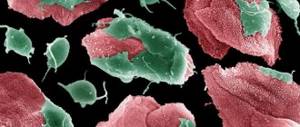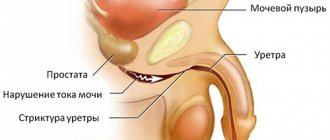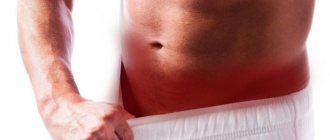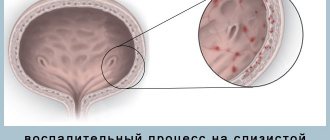Author of the article
Anatoly Shishigin
Reading time: 3 minutes
AA
Pain, burning or itching when urinating or ejaculating semen after sexual intercourse are quite unpleasant symptoms, which, moreover, are quite dangerous. Many men ignore these sensations, most often with the hope that they will go away on their own without special treatment. This cannot be allowed, therefore, first of all, you need to figure out why the urethra hurts after ejaculation, a man must find out the source of such discomfort.
Non-pathological itching
This group includes unpleasant sensations due to external causes that have nothing to do with pathologies. Urethral itching in women without discharge is typical for this group of causes.
What can be attributed to them:
- Hypothermia or overheating is accompanied by stagnation of lymph and blood, their outflow slows down. Because of the cold, blood vessels spasm, and local immunity drops noticeably. Swelling occurs, which narrows the walls of the urethra, urine also passes slowly and begins to irritate the mucous membrane. When hypothermia occurs, pain occurs in the lower abdomen, radiating to the lower back and sacrum, pain and burning when urinating. With timely measures, itching can easily be removed without an inflammatory reaction.
- Insufficient drinking regime - urine becomes more concentrated in terms of salts. It does not pass through the urethra without a trace, irritation and burning with salt crystals will certainly occur. The temperature may rise and the woman may feel sick.
- Wearing tight underwear and clothing provokes the above-mentioned blood stagnation and mechanical damage.
- Mechanical friction in the groin – occurs after cycling. This is always fraught with tissue swelling. The answer is itching in the urethra.
- Excessive consumption of salt, fatty, smoked, spicy foods increases the concentration of salts in urine.
- Genital piercings cause seemingly minor mechanical trauma, but they can cause itching. This also includes microtraumas after sex, trauma to the mucous membrane with nails when washing, the hardness of toilet paper, synthetics and uncomfortable style of underwear, and birth injuries to the ureter. If this fact is ignored, infection of the urethra and itching may occur.
- Taking antibiotics disrupts the number of beneficial microflora and changes the composition of urine. Irritation of the walls of the urethra is its consequence.
- Insufficient hygiene can also cause problems, especially during menstrual periods. Frequent douching has a negative effect. Even sufficient hygiene when using aggressive care products can cause severe irritation of the skin and mucous membranes. You can suspect such products by the strong smell of soap, bright color, cheap price, etc.
- Contact with allergens can also occur when using laundry washed in cheap washing powders, inappropriate lubricant on a condom, aromatic additives in pads, tampons, etc.
- Surgery on the urinary tract can provoke itching in the urethra, but in this case it will indicate the healing process. This itching does not require treatment and goes away on its own. At this time, the doctor may prescribe antibacterial suppositories.
Conclusions: a distinctive feature of itching and burning due to the action of natural factors is the absence of discharge; when the irritating factor is eliminated, the symptom immediately disappears.
Treatment recommendations
Conservative treatment in medical practice involves the use of antimicrobial agents to counteract the burning sensation inside the urethra. Traditional therapy and herbs help remove inflammation and reduce the symptoms of the disease. Traditional medicine is not able to remove the main cause of the burning sensation, since they are weaker than antibiotics, but they will help improve the patient’s well-being:
- It is necessary to mix equally 1 tbsp. l. horsetail, dried lingonberry leaves and chamomile. Next, the mass is poured with 0.3 kg of water and boiled in a water bath for 10 minutes. When the broth is removed from the heat, it is filtered and drunk hot.
- You need to mix oak bark, linden and bearberry in equal quantities in a thermos. Afterwards the mass is poured with boiling water and left for 60 minutes. You need to use the product 1 tbsp. l. three times a day 30 minutes before meals.
- Mix dried birch leaves, licorice root, bearberry and corn silk. The ingredients are mixed in equal proportions, and then a glass of boiling water is added to the finished mixture and kept in a water bath for 15 minutes. After the specified period, the medicinal herbs are removed from the water bath and infused in a cool place for approximately 40 minutes. The resulting product must be taken warm three times a day and 30 minutes before meals.
Timely therapy will eliminate the pathological process in the shortest possible time.
In addition to conservative methods of therapy, there are also traditional medicines used at home, but with the permission of the attending physician. Complex treatment with antibiotics and folk remedies gives positive results.
Hormonal changes
The causes of itching in the urethra in women may be due to hormonal imbalance. This manifests itself in painful and frequent urination, burning and itching of the genitals, discharge in the form of leucorrhoea and mucous lumps, discomfort during washing.
Such changes may be associated with thyroid dysfunction and, in physiology, with pregnancy. In its first trimester, a hormonal surge occurs, the mucous membranes swell due to increased levels of prolactin (the pregnancy hormone necessary for its successful course). After 14 weeks, such symptoms disappear on their own, and hormonal levels normalize by this time. You cannot self-medicate in such cases, so as not to provoke a miscarriage.
Pain in the urethra with prostate adenoma
Benign prostatic hyperplasia does not cause pain in the urethra.
The exception is when it reaches large sizes and begins to compress the back of the canal.
A man has difficulty urinating.
Pressure in the urethra increases.
Therefore, urination can be not only difficult, but also painful.
If such symptoms appear, you can get rid of them with the help of medications.
But at a certain stage in the development of the disease, surgery may be required.
Most of the prostate gland is removed, after which urodynamics are restored.
Gonorrhea and other pathologies
Neisseria gonorrhoeae - these gonorrhea pathogens can spread up the urethra even during unprotected sex. The infection is contagious during any type of sex.
Itching in the urethra is the first sign. It intensifies with urination, then the genitals become inflamed and green-white purulent discharge appears.
Chlamydia and herpes simplex are also sexually transmitted and are accompanied by itching in the urethra during urination. The discharge is small in volume and transparent; there is aching pain in the lower abdomen and groin, severe general weakness appears.
Bacterial vaginosis is an imbalance of lactobacilli and an increase in opportunistic microflora, especially gardnerella. Therefore, the second name of the pathology is gardnerellosis. Dryness occurs in the perineum, constant itching in the urethra in women, and frequent urges. The discharge is characterized by its smell of rotten fish. They have a greenish color. The most common cause of burning and itching in the urethra is trichomoniasis. It is the most common. In addition to itching, it is accompanied by discharge from the urethra, hematuria, and pain when urinating.
Signs of the disease appear quickly – 3-5 days after infection. In men, the pathology is often asymptomatic. Self-medication is excluded because, although the symptoms are similar, the causes and treatment are different.
Why does pain occur after ejaculation?
It is useless to hope that these symptoms will go away without treatment, since they indicate diseases in the urinary system. Pain in a man can have different etiologies; it occurs during the ejection of seminal fluid, and after that it becomes aching or very sharp.
The most common clinical picture is the patient interrupting sexual intercourse in order to prevent the woman from becoming fertilized. If used for a long time, then this method of contraception provokes a malfunction of the genitourinary system, and also causes discomfort after intimacy. Usually, after changing the method of ending sexual intercourse, all functions of the organs of the reproductive system return to normal functioning.
The most common reasons for pain after ejaculation are the following:
- diseases that are transmitted through sexual contact - gonorrhea, trichomoniasis, chlamydia and others;
- inflammation in the genitourinary system - prostatitis, vesiculitis, orchitis;
- inflammation and pathology of the urinary system - urolithiasis, urethritis and cystitis.
It is important to determine the root cause of burning or pain in the urethral canal during urination or ejaculation. Provoking factors can be identified after additional examination and a series of tests in the laboratory of a hospital or clinic. Moreover, each man has concomitant diseases and individual characteristics that need to be considered in more detail.
Fungal infections
Another common cause of itching and burning in the urethra in women is fungal infections or candidiasis, thrush.
Pathology can be provoked by:
- sweet and flour;
- stress;
- dysbacteriosis;
- decreased immunity, for example, during pregnancy.
In this case, discharge and itching from the urethra in women will accompany you until the fungus is eradicated. Urination becomes more frequent, which becomes painful, and a cheesy discharge with a characteristic sour-milk odor appears.
What tests should I take for pain in the urethra?
It is important to find out the cause of the pain in order to plan the optimal therapeutic strategy.
This requires laboratory and instrumental tests.
The patient is tested for:
- sexually transmitted infections (urethral swab)
- bacteriological culture
- blood for allergies
- general clinical examinations, including general urine analysis
An ultrasound of the kidneys is performed.
During the study, urolithiasis may be detected.
Urethroscopy is performed according to indications.
It is needed primarily for patients with pain of unknown origin, in the absence of signs of inflammation.
If prostate pathology is suspected, a blood test for PSA is performed, a transrectal ultrasound of the prostate is performed, and the secretion is examined.
Kidney diseases
Among them are pyelonephritis and urolithiasis. Their common symptoms:
- frequent urge to urinate and scanty amount of urine;
- itching and burning in the urethra;
- cramps in the lower abdomen;
- pain in the lower back and sacrum;
- increased blood pressure - all these symptoms appear gradually and not together.
So, first things first:
- Urolithiasis disease. It can be considered more of a mechanical factor. When stones and sand come out, the walls of the bladder and urethra are damaged. This is what causes pain and burning during urination, itching in the urethra, pain in the lower abdomen, and blood in the urine.
- Pyelonephritis is inflammation of the renal pelvis. With such inflammation, the composition of urine changes (the appearance of sugar and protein in it), which cannot but be reflected in irritation of the walls of the urethra.
- Cystalgia. It is caused by the high sensitivity of the bladder with normal urine composition, i.e. these disorders are functional. Itching in the urethra in women, burning and pain when urinating, dryness in the perineum occur during menstruation and after intimacy. There are no inflammations or morphological changes in tissues. Cystalgia is typical for young girls. It goes away when menstruation stops or sufficient time has passed since the end of sexual intercourse. If the itching does not stop, you need to look for other causes.
- Foreign bodies - they can get into the urethra through careless removal of a tampon, using various “toys” for sex and masturbation. Suspicions of the presence of a foreign particle arise if, in addition to itching in the urethra, the outflow of urine becomes difficult. The stream becomes thin or does not appear at all. Only a doctor can remove foreign particles.
- Cystitis is the most common cause of itching in the urethra in women with a painful burning sensation. It is then accompanied by frequent imperative urges, scanty urine (false urges), and severe pain in the lower abdomen. When emptying the bladder, the pain intensifies. It is almost constant, it may decrease somewhat, but does not disappear completely. Often cystitis in a woman is a consequence of urethritis. This is the most common cause of itching in women in the urethral area. Pathologies can be provoked by hypothermia, prolonged retention of urination, and ingestion of spicy or spicy foods. Also characteristic of cystitis is a change in the color of urine - white flakes and bloody threads can be seen in it with the naked eye.
Factors provoking the occurrence of symptoms
These factors are:
- the need for long-term patience when it is impossible to go to the toilet. As a result, vigorous division of microbes in the bladder occurs, which leads to infection;
- absence of an organ that disinfects the urinary tract (prostate);
- undergoing operations in which a catheter was used;
- diabetes;
- an allergic reaction to medications that the patient is forced to take for a long time;
- openness to bacteria and close proximity to the vagina;
- incontinence in sex.
Symptoms of urethritis in women
In acute urethritis, characteristic symptoms are burning, pain and itching in the urethra in women when urinating. In some cases, there may be purulent discharge from the urethral opening. Subsequently, the pain and swelling decrease, and the discharge stops. Urine is usually clear, sometimes with isolated purulent streaks. In the acute form of urethritis, the urge to urinate is imperative, and pain is more common at the end of urination.
The general condition of urethritis in women is usually not affected. Acute symptoms disappear within 2-2.5 weeks. But this does not mean the cessation of inflammation; you need to be examined by a doctor. With insufficient treatment, acute urethritis becomes chronic. It will become aggravated and will remind itself with hypothermia, sexual arousal and frequent sexual intercourse, and drinking alcohol. Then its symptoms will resemble torpid urethritis.
Symptoms and treatment
This pathology is an inflammatory process in the urethra, which occurs two months after the first symptoms. The most common route of infection is sexual contact with a sick person.
Symptoms of urtritis
During the chronic form, the following symptoms are pronounced:
- burning and unbearable itching in the genital area;
- blue or green discharge accompanied by an unpleasant purulent odor;
- swelling and inflammation of the urethra in men;
- pain during sexual intercourse;
- presence of blood in discharge, urine or semen;
- frequent urination;
- adhesion.
If several symptoms appear at once, you should consult a specialist as soon as possible. The basis of treatment for this pathology is the use of antibacterial drugs.
Attention! It is important not to delay the course of the disease and begin treatment as early as possible, while keeping in mind that the chronic form lasts from one month to several years and entails serious complications.
Treatment is usually carried out on an outpatient basis, but if the form is severe, hospitalization will be required . Here it is important to restore the epithelium and microflora, but do not forget about the immune system, which supports the body and allows it to fight infections.
The presence of a chronic form of the disease is confirmed exclusively by a specialist, as a result of which you cannot self-medicate, even if all the symptoms indicate the presence of this particular pathology.
The most effective medications for topical use are solutions of Garazon and Sofradex , which can reduce the course of treatment by a week.
In addition, they are perfectly absorbed, and the side effects are almost invisible.
But in addition to them, it is important to use antibiotics, combining them with physiotherapy, such as hot baths, ultrasonic frequencies and heating.
As for traditional methods, they are only allowed to be used in conjunction with the main treatment, since otherwise they will not give the desired effect or will worsen the situation.
Tumors
Polyps often form in the urethra as tumor precursors. Symptoms at this stage are sparse. The itching increases and becomes burning. Then permanent pain and bloody clots in the urine appear. Without treatment, the general condition worsens. Treatment is only surgical.
Malignant neoplasms are also scanty in manifestations. Over time, the pain increases in the urethra, and blood appears in the urine. In neglected conditions, anemia and general exhaustion develop.
Whatever the cause of burning and itching in the urethra in women, it is imperative to be examined and begin treatment in order to avoid complications and transition to a chronic process, which is much more difficult to treat.
Gonorrheal urethritis
This pathology is a sexually transmitted disease that is caused by gonococcus, a gram-negative diplococcus of the Neisseriae family.
Based on the severity, gonorrheal urethritis can be of three types:
- Acute, characterized by copious discharge and dysuria.
- Subacute, during which discharge is equally present but there is no dysuria.
- Torpid, in which the discharge may be insignificant and not always detectable.
The first symptoms are discomfort in the urethra with urinary retention and grayish-yellow purulent discharge.
The first portion of urine is cloudy and contains urethral threads that settle at the bottom. When urinating, the patient has pronounced pain and ejaculation.
Drops of blood often appear at the end of urination, and frequent erections also add to the general condition, and there may also be drops of blood in the semen.
Attention! It is very important to start treatment as early as possible, since otherwise the acute form quickly turns into chronic, in which symptoms do not appear, but the inflammatory process remains.
Treatment of urethral itching
During therapy, doctors focus on 3 things:
- normalization of the walls of the urethra;
- normalization of the microflora of the vagina and uterus, by getting rid of pathogens;
- restoration of immunity.
The treatment of itching in women in the urethra should include the following components:
- Broad-spectrum antibiotics - cephalosporins (Cefazolin, Cefotaxime, Ceftriaxone), macrolides (Azithromycin, Clarithromycin); fluoroquinolones (“Clinafloxacin”, “Ciprofloxacin”). It is important that for their successful use it is necessary to determine the causative agent of the disease and its sensitivity to a certain type of antibiotic. Otherwise, the effect may not be seen. For gonorrhea, “Erythromycin”, “Spectinomycin”, “Oletetrin”, “Ceftriaxone”, “Rifampicin”, “Cefacor” are effective. Trichomonas do not like Metronidazole (Trichopol), Imorazole, Ornidazole, Chlorhexidine, or Iodovidone suppositories. For candidiasis - Levorin, Nystatin, Natamycin, Amphoglucamine, Clotrimazole. Chlamydial and mycoplasma urethritis will be well treated with tetracycline antibiotics.
- Local therapy - various sitz baths (a weak mixture of potassium permanganate, furatsilin, herbal decoctions of chamomile and sage, etc.).
- Insertion of special tampons with medicinal ointments into the vagina.
- The use of immunostimulating and immunomodulating drugs. When treating urethritis, the water regime must be strictly observed. It is also important to pay attention to your diet. It is better to exclude provoking foods. For viral urethritis, antiviral drugs are used: Ganciclovir, Acyclovir, Ribavirin, Famciclovir, Penciclovir, etc.
- Physiotherapy in the form of electrophoresis on the pubis and vaginally, diadynamic therapy of the lumbosacral zone, heating applications.
Diagnostic methods
A comprehensive examination when a burning sensation occurs in the urethra and head is necessary to make an accurate diagnosis. Research will help determine the degree of development of diseases; the results obtained are also necessary to draw up an effective treatment regimen.
A burning sensation in the urethra and in the head requires the following diagnostic tests:
| Name | Description |
| General urine analysis | The results show the level of red blood cells, white blood cells and protein. |
| General and biochemical blood test | Research allows us to identify the inflammatory process in the patient’s body. |
| Bacterial culture | A diagnostic method by which a specialist determines the pathogen and its sensitivity to antibacterial drugs. |
| Ultrasound examination (ultrasound) | The examination method is used to assess the functioning of the kidneys, bladder, pelvic organs and prostate gland. |
| Cystoscopy | Diagnosis involves examining the mucous membrane in the urinary tract area. The results help identify a tumor, foreign body or stones. During the procedure, the doctor may take materials for laboratory tests (biopsy). |
| Uroflowmetry | A specific examination method during which the doctor examines the upper and lower urinary tract. The purpose of the diagnosis is to evaluate the functioning of the bladder and urinary tract. |
It is important to differentiate the disease, since many pathological processes are accompanied by similar clinical symptoms. It is necessary to establish an accurate diagnosis, on which the treatment method depends.
Prevention
Prevention in women:
- hormone replacement therapy for menopause;
- eliminating stress;
- medical examinations with a gynecologist every six months;
- compliance and correct intimate hygiene;
- avoiding hypothermia;
- exclusion of abortion;
Regular sex is also important, but with one partner - the culture of sexual relations. This is not the case when the number of partners turns into quality.
Itching during urination in pregnant women
The fetus puts pressure on the ureter and bladder, so the pregnant woman feels a frequent urge to urinate. Sometimes discomfort appears after an examination by a gynecologist and goes away in one day. This should not cause concern if there are no other symptoms. But if a woman experiences itching and burning after urinating, she must undergo additional examination. This is how infectious and non-infectious diseases and allergies can manifest themselves.
The doctor should choose the course, determining exactly why the genitals and urethra itch.
You cannot take medications or perform procedures at home on your own. They can cause pregnancy pathologies.
How to avoid pain?
The burning sensation after intimacy does not only cause physical discomfort. Lack of treatment can lead to psychological problems, decreased potency and erectile dysfunction. This is due to the fact that a man will try to avoid sex so as not to experience pain.
The following is recommended as a preventive measure:
- Avoid promiscuity;
- Always use a condom during sex;
- Regularly undergo preventive examinations with a urologist;
- Treat any chronic diseases in a timely manner;
- Support immunity with vitamins and a balanced diet.
You should not put off going to a medical specialist if you experience a burning sensation after sexual intercourse. Ignoring a symptom leads to the disease becoming chronic, which is much more difficult to treat and significantly worsens the patient’s quality of life.
It is impossible to completely eliminate the risk of developing diseases that are accompanied by a burning sensation in the penis. But compliance with preventive measures allows you to minimize this likelihood and maintain health.
How to eliminate discomfort in the urethral area
First of all, you need to consult a doctor, which will help determine the causes of such a symptom. Depending on this, a course of treatment is prescribed. In most cases, a course of taking certain drugs is prescribed to destroy the sources of the disease. Most often, antibiotics are used for treatment, which makes it possible to cope with the causative agent of the disease in the shortest possible time.
Doctors often also advise using antiseptic solutions to wash the area. Thanks to this, you can get rid of the causative agent of the disease quite quickly.
The duration of treatment for various diseases in women and men in each case can differ radically. Everything directly depends on the cause of scabies. In most cases, you can get rid of unpleasant sensations in just a few weeks. If you delay in contacting a doctor, the duration of treatment may increase significantly. Moreover, during this period it is necessary to limit yourself from possible sexual intercourse.
Itching in the urethra
is one of the symptoms inherent in diseases that affect the genitals and urinary tract. Diseases can be transmitted by various harmful microorganisms, including:
— pathogens of sexually transmitted diseases (gonococci, chlamydia, trichomonas, etc.);
Staphylococcus bacilli, streptococcus bacilli, E. coli and others.











